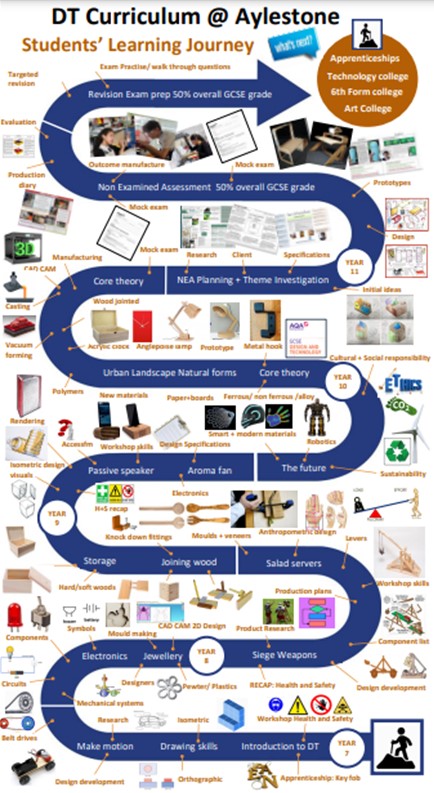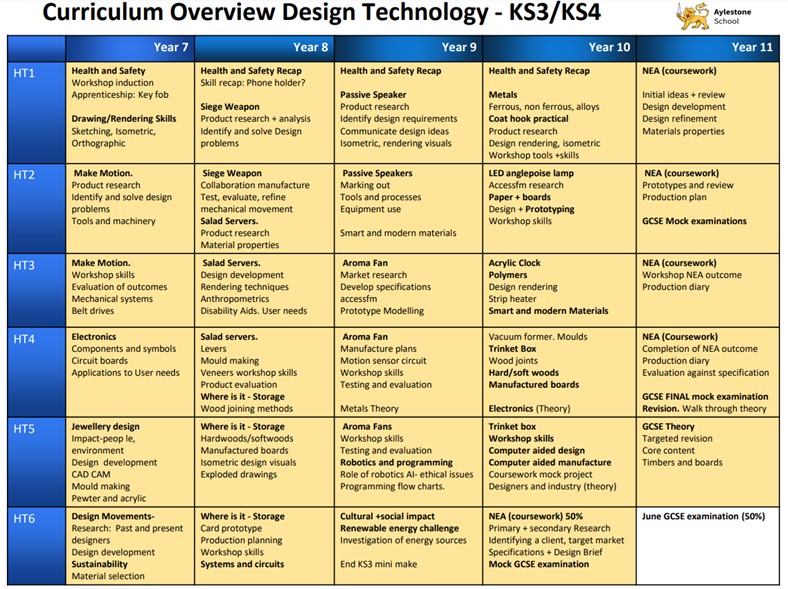Design Technology
Technology students are supported to develop their creative problem-solving through a balanced mix of practical and theory based activities. All students are encouraged to become confident in addressing ethical, economic and environmental factors in their design of prototypes and products. Through sequential learning tasks, every student will gain a secure understanding of the impact of technology and design on their life and the wider world.
Department Aims
1.All students are able to access a creative Design Technology education through a balanced mix of engaging practical and theory learning opportunities.
2.Students learn how external factors including ethical, environmental and economic considerations help shape successful design and manufacture.
3.Students develop confident practical skills through the mastery of challenging subject-based tasks including designing, prototyping and manufacture.
4.Students are fully aware of Health and Safety considerations inherent in Design and manufacture and able to learn in a safe, respectful environment.
5.Students develop their competencies of inquiry, analysis and critical thinking through written, visual and oral communication using Design Technology vocabulary.
6.Students develop an understanding of British values especially focusing on collaboration, importance of rules, mutual respect and tolerance for others.
7.Students develop an appreciation of Design Technology and its integral and evolving contributions to the world.
8.Students gain understanding of the transferable skills developed within the subject and specific career opportunities linked to the subject.

GCSE Design Technology - Timbers
What will I learn?
Learning is based on a variety of design and practical tasks in metal, wood and plastic. You will learn how designers design the weird and wonderful as well as the practical. Projects in CAD/ CAM will develop your skills in Computer Aided Design and Making and practical projects in enamelling, raising, forging and carpentry, will expand your making skills in preparation for your Controlled Assessment task in year 11.
How will I learn?
In year 10, you will complete a range of design and make projects, using wood, metal and plastic as well as CAD/CAM. The projects will follow the design process:
DESIGNING - investigation leading to the production of a variety of ideas which, after development, promotes the evolution of a design proposal in detail.
MAKING - selection and use of materials, processes, tools and equipment to produce high quality products;
KNOWLEDGE AND UNDERSTANDING - all aspects which aid the development of a designing and making capability but, specifically, those relating to materials and components, systems and control, structures, products and applications, quality and Health & Safety.
How will I be assessed?
In year 10 you will be assessed by your teacher at various stages in the project and will complete a final assessment at the end of each project. We follow the AQA syllabus and the GCSE is 50% Controlled Assessment and 50% external theory exam, the latter taking place at the end of year 11. AQA set the Controlled Assessment tasks and you will be given a range of tasks to choose from. Previous tasks include: jewellery, coffee table, garden project and storage and you will have 45 hours to complete a design folder and a practical outcome. This is worth 50% of your final grade. The external theory exam makes up the remaining 50% of your grade.
What can I progress to?
Engineering, construction, welding, blacksmithing, jewellery designer and maker, goldsmith, silversmith, teacher, lecturer, furniture maker, set designer, set constructer, toy designer and many, many more B.A Jewellery and Metalwork.
Further Information
Mr Stevenson
Email: MStevenson@aylestone.hereford.sch.uk

